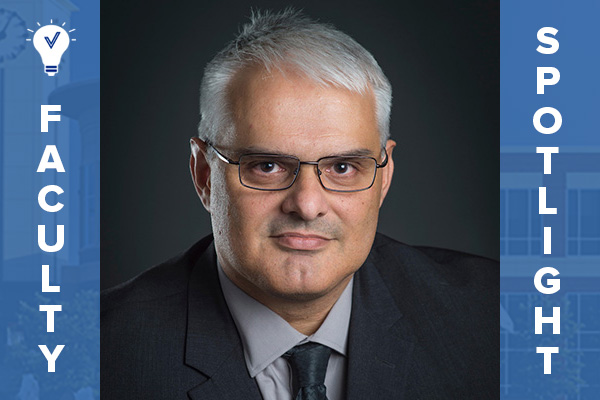School of Public Health
Faculty Spotlight - Dr. Ilias Kavouras

Q&A with Dr. Ilias Kavouras, PhD
Assistant Dean of Academic Affairs and Professor, EBE Division
- What brought you to the U of M School of Public Health?
The exciting portfolio of academic affairs while maintaining didactic and scholar activities was very attractive. Being part of a growing, engaging, student-centered, impactful school and working with renowned colleagues under the leadership of Dean Joshi informed my decision to join UofM. Last but not least, the opportunity to translate our work into real and meaningful improvements of communities in Memphis, Mid-South, Tennessee and worldwide. - What is the broad focus of your research?
My scholar activities focus on understanding the interplay between natural and anthropogenic activities, how they modify the quality of the air we breathe and affect human health. - What inspired you to pursue this particular area of research?
The unique challenges to study these complex processes. In this line of experimental research, every day is unique, with tasks to work and problems to solve, and when we do a lot of them then we get to cure disease and improve quality of life for all. It also has side effects, it makes us stronger, builds character, resilience and creativity to learn from drawbacks and find new ways. I would not do any other way. - What is the most exciting project you are currently working on?
It must be two projects. First, our work on the detrimental effects of wildfires on humans include loss of life and property that affects everybody here in Tennessee, US and globally. The second is how vaping invaded into adolescence and youth with potentially deleterious outcomes that match and exceed that of tobacco smoking. We can tackle these two challenges because of our ability to implement multi-prone approaches with field investigations, yes, we do go as close as we can to fires, laboratory tests, epidemiological studies, geospatial analysis, remote sensing and modeling. - How does your research impact or benefit the broader community or public health field?
And how do you envision your research evolving in the next few years?
This research aims to bring together solutions to mitigate the root causes of process that affect the quality of breathing air at a community and individual level, wildfires and vaping, and develop time-sensitive practices and tools to prepare, cope and mitigate the adverse effects. They are evolving tasks; nature adapts to human interferences in asymmetric and unknown ways. At the same time, tobacco industry get creative with marketing and new products. It makes our work more difficult but also more interesting, much needed, time-sensitive and rewarding. - What is the coolest training or program you've been a part of, or your favorite conference
you've attended?
Every step in my career uniquely shaped my professional trajectory. I did gain lifelong skills much more than academics during my tenure with the City University of New York and Desert Research Institute, experiences that are shaping next steps in academic administration and leadership here at the University of Memphis. - What is your favorite self-authored manuscript?
It is a paper published very early in my academic career in the leading scientific journal, Nature, in which using a novel protocol, we identified for the first time, the chemical species that are responsible for the haze over forests. This is the same haze for which the Smoky Mountains in Eastern Tennessee, Los Angeles and many urban areas are known for. Formation of atmospheric particles from organic acids produced by forests | Nature - What kind of research would you like to be doing that you haven't yet had the opportunity
to do?
I haven’t thought about that. I guess, it will be going back to my roots as a chemist and designing and creating new compounds that cure diseases and. make us safer and healthier. We are doing that by looking into the content of smoke and vapors for new compounds that can cause harm. - Are there any publications, awards, or recognitions you would like us to include in
the spotlight?
Our most recent work, published in the leading scientific journal, Nature, a multi-center collaborative study designed and executed on the spot as a massive wildfire smoke plume was approaching New York City and eastern United States. The study enabled us to characterize the local and regional climate and health impacts and demonstrate the need to work together across nations and continents to address them. We are members of a large ecosystem; we must work together because nature is not listening to narratives, and it is unforgiving. Everything we do it affects everyone, and small contributions can have big effects. https://www.nature.com/articles/s43247-025-02214-3.

